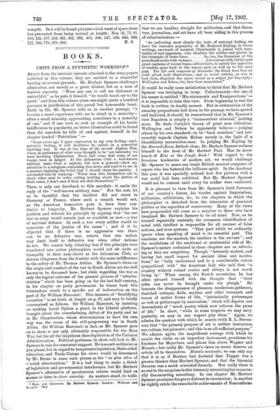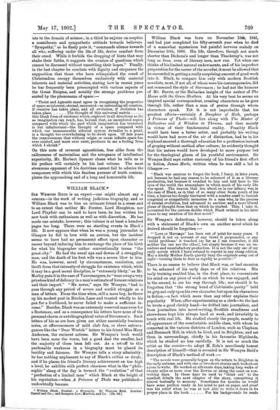BOOKS.
CHIPS FROM A SYNTHETIC WORKSHOP.*
APAIZT from the intrinsic interest attached to the stray papers collected in this volume, they are entitled to a respectful hearing on several grounds. Mr. Herbert Spencer challenges admiration, not merely as a great thinker, but as a man of fearless sincerity. " Were any one to call me dishonest or untruthful," as he puts it himself, " he would touch me to the quick," and from this volume alone one might quote a hundred passages in justification of this proud but honourable boast. Early in life, Mr. Spencer tells us in another passage, "it became a usual experience with me to stand in a minority—
often a small minority, approaching sometimes to a minority of one." and if one were to seek an example of his heroic indifference to popularity, no better illustration could be found than the anecdote he tells of, and against, himself in the chapter headed " Patriotism "
" Some years ago I gave expression to my own feeling—anti- patriotic feeling, it will doubtless be called—in a somewhat startling way. It was at the time of the second Afghan War, when, in pursuance of what were thought to be our interests,' we were invading Afghanistan. News had come that some of our troops were in danger. At the Atheneum Club a well-known military man—then a captain, but now a general—drew my attention to a telegram containing this news, and read it to me in a manner implying the belief that I should share his anxiety. I astounded him by replying : When men hire themselves out to shoot other men to order, asking nothing about the justice of their cause, I don't care if they are shot themselves."
There is only one drawback to this anecdote : it omits the reply of the " well-known military man." For the rest, let
us be thankful that the incident did not occur in Germany or France, where such a remark would not, as the American humourist puts it, have been con- ducive to longevity. Mr. Herbert Spencer explains his position and defends his principle by arguing that "for one war an army would remain just as available as now,—a war
of national defence. In such a war every soldier would be conscious of the justice of his cause " ; and if it be objected that if there is no aggressive war there can be no defensive war, retorts that one nation may limit itself to defensive war when other nations do not. We cannot help thinking that if this principle were translated into action philosophers would not sit quite so tranquilly in their easy-chairs at the Athenaeum Club, or discuss telegrams from the frontier with the same indifference to the safety of Mr. Thomas Atkins. Mr. Spencer's views on the origin and conduct of the war in South Africa are too well known to be discussed here; but while regarding the war as only the logical outcome of the general process of "rebarba- rization " which has been going on for the last half-century, in his chapter on party government he traces back this tremendous result to a specific act of indiscretion on the part of Sir William Harcourt! This instance of "fructifying causation" is set forth at length on p. 97, and may be briefly summarised as follows. Sir William Harcourt, by insisting on making Local Option a plank in the Liberal platform, brought about the overwhelming defeat of his party and let in Mr. Chamberlain, whose determination to have his own way was the cause of the still-progressing war in South Africa. Sir William Harcourt, in fact, as Mr. Spencer goes on to show, is not only ultimately responsible for the Boer War, but for all the iniquitous class-legislation of the Unionist Administration. Political partisans, in short, will look to Mr. Spencerin vain for consistent support. He is as anti-militarist as you please, but in regard to temperance legislation, State-aided education, and Trade-Unions his views would be denounced by Mr. Burns in some such phrase as the "ne plus ultra of erusted obscurantism." It is a bad thing to make a fetish of legislative and governmental interference, but Mr. Herbert Spencer's alternative of spontaneous reform would land us sooner or later in sheer anarchy. As matters stand, he holds
• Facts and Comments. By Herbert Spencer. London: Williams and lvorirate i6s.e
that we are heading straight for militarism, and that litera- ture, journalism, and art have all been aiding in this process of rebarbarization
As indicating most clearly the state of national feeling, we have the immense popularity of Mr. Rudyard Kipling, in whose writings one-tenth of nominal Christianity is joined with nine- tenths of real paganism ; who idealises the soldier and glories in
the triumphs of brute force So, too, the literature of the periodicals reeks with violence Not content with battles and
great captains of recent times, editors have, to satisfy the appetites of readers, gone back to the remote past as well as to the near past. The life and conquests of Alexander the Great have been set forth afresh with illustrations ; and in serial articles, as also in book form, Napoleon has again served as a subject for biography : Wellington and Nelson, too, have been resuscitated."
It would be really some satisfaction to think that Mr. Herbert Spencer was indulging in irony. Unfortunately—for one of his essays is entitled " Mis-statements and Exaggerations"— it is impossible to take this view. From beginning to end the book is written in deadly earnest. But in extenuation of the amazing propositions laid down in the passage we have quoted and italicised, it should be remembered that in Mr. Spencer's
view Napoleon is simply a "transcendent criminal," nothing more. He finds Carlyle's theory of great men ridiculous.
Wellington and Nelson be apparently believes—judging
others by his own standard—to be " back numbers," and pre- sumably regards Captain Mahan merely in the light of a bloodthirsty resurrection-man. In judging Mr. Kipling by the Barrack-Room Ballads alone, Mr. Herbert Spencer reduces himself to the level of Mr. Herbert Paul. Has he never heard of Kim or the Jungle Book ? With regard to the ferocious tendencies of modern art, we would challenge Mr. Spencer to name any single British musical composer of repute who has fostered the bellicose spirit. In the Academy this year it was specially noticed how few pictures with a war motif had been exhibited. But Mr. Herbert Spencer would not be content until every tin soldier were cashiered.
It is pleasant to turn from Mr. Spencer's lurid forecasts of our country's future, his tirades against Imperialism, militarism, athleticism, &c., to the chapters in which the philosopher is detached from the intricacies of practical politics or the asperities of controversy. Many of the views here propounded will come as a surprise to those who have imagined Mr. Herbert Spencer to be all mind. Now, as he himself repeatedly contends, the erroneous identification of mind with intellect is responsible for all manner of false notions, and even systems. " That part which we ordinarily ignore when speaking of mind is its essential part. The emotions are the masters, the intellect is the servant" ; and the revelations of the emotional or sentimental side of Mr. Spencer's nature contained in these chapters are as refresh- ing as they are surprising. Though " intensely modern, and having but small respect for ancient ideas and institu- tions," he " fully understood and to a considerable extent sympathised with " the American lady who said that " a country without ruined castles and abbeys is not worth living in." When among the Scotch mountains, he has often pleased himself with the thought that " their sides can never be brought under the plough." He laments the disappearance of gleaners, mushroom-gatherers, thatched cottages, flails, scythes, and other remnants and traces of earlier forms of life, " intrinsically picturesque as well as picturesque by association," which will deprive our descendants of " much poetry which now relieves the prose of life." In short, " while in some respects we may envy posterity, we may in one respect pity them." Again, we admire the candour with which he asserts (with R. L. Steven- son) that "the primary purpose of art is neither instruction nor culture, but pleasure ; and this is an all-sufficient purpose." We admire, again, the magnificent courage with which he assails the violin as an imperfect instrument, proclaims his fondness for Meyerbeer, and places him above Wagner and Mozart,—but really Mr. Spencer's views on music deserve an article all to themselves. Mutatis mutandis, we can only say that it is as if Brahms had declared that Tupper was a greater thinker than Herbert Spencer, and that the binomial theorem was a much overrated formula- But really there is no end to the surprises in this intensely interesting but occasion. ally disconcerting miscellany. In one chapter Mr. Herbert Spencer proclaims his grave distrust in vaccination; in another he rightly extols the remarkable achievements of Nonconform• jots in the domain of science ; in a third he enjoins on sceptics
a considerate and sympathetic attitude towards believers. "Sympathy," as he finely puts it, "commands silence towards all who, suffering under the ills of life, derive comfort from their creed. While it forbids the dropping of hints that may shake their faiths, it suggests the evasion of questions which cannot be discussed without unsettling their hopes." Finally, in the last chapter he combats with dignity and eloquence the supposition that those who have relinquished the creed of Christendom occupy themselves exclusively with material interests and material activities, stating how in recent years he has frequently been preoccupied with various aspects of the Great Enigma, and notably the strange problems pre- sented by the phenomena of space :--
"Theist and Agnostic must agree in recognising the properties of space as inherent, eternal, untreated—as anteceding all creation, if creation has taken place, and all evolution, if evolution has
taken place The thought of this universal matrix this blank form of existence which, explored in all directions as far as imagination can reach, has, beyond that, an unexplored region compared with which the part which imagination has traversed is but infinitesimal—the thought of a space compared with which our immeasurable sidereal system dwindles to a point, is a thought too overwhelming to be dwelt upon. Of late years the consciousness that without origin or cause infinite space has ever existed, and must ever exist, produces in me a feeling from which I shrink."
On this note of reverent agnosticism, free alike from the callousness of materialism and the arrogance of intellectual superiority, Mr. Herbert Spencer closes what he tells us in his preface will certainly be his last volume. The most strenuous opponent of his doctrines cannot fail to admire the composure with which this fearless pursuer of truth contem- plates the approaching end of a long and honourable life.







































 Previous page
Previous page